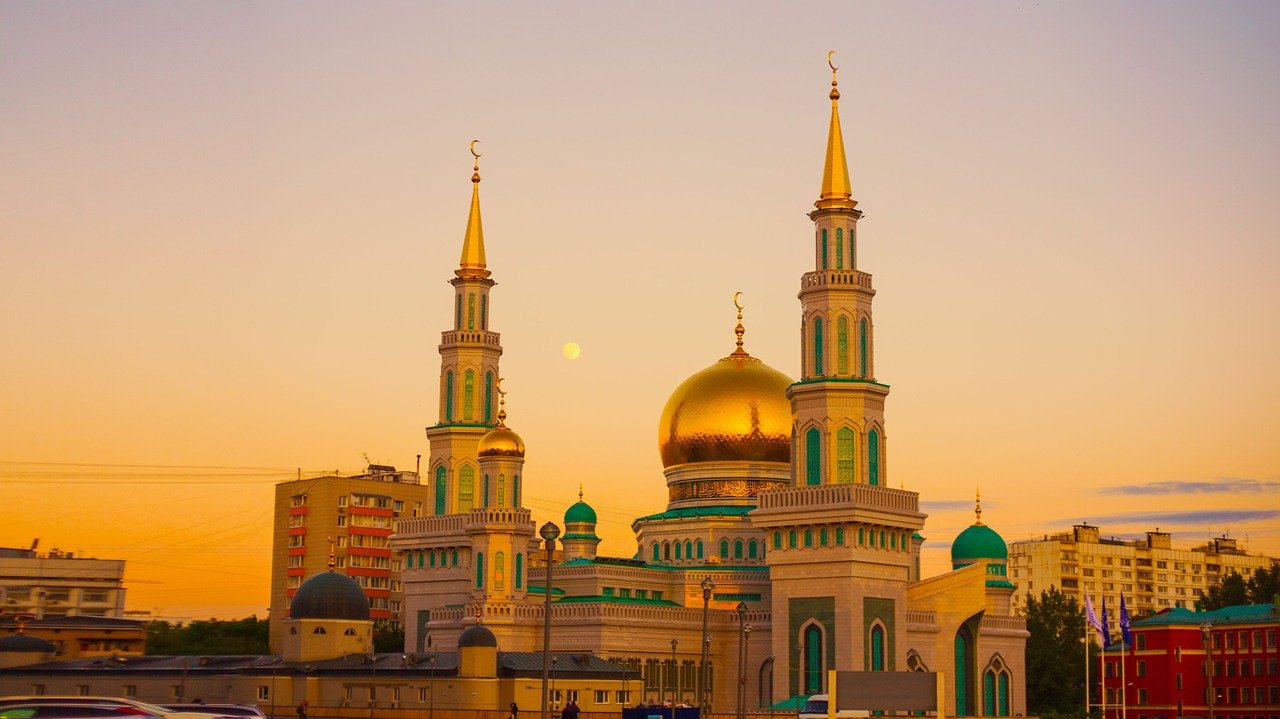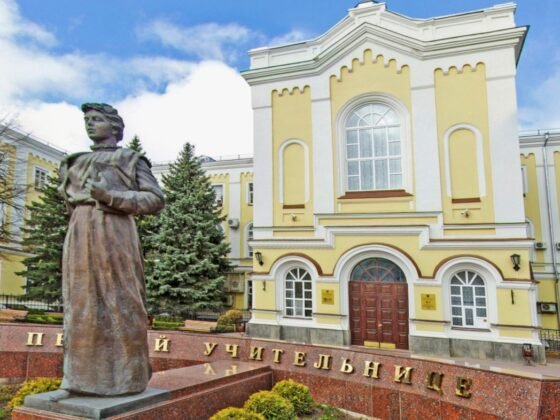Russia’s invasion of Ukraine on February 24 has deepened the existing cracks within Russia’s biggest religious institution, the Russian Orthodox Church (ROC). The Moscow Patriarchate is about to lose its Ukrainian eparchies that have, until recently, remained obedient to Patriarch Kirill. Little, however, has been said about reactions to the invasion among Russia’s Muslim leaders, who represent Russia’s second-largest religion—Islam. The presence of the “Islamic factor” in the Russian military campaign became apparent after the deployment of thousands of Kadyrovtsy—troops not incorporated into the Russian army but under the direct command of Ramzan Kadyrov, the head of the Muslim-majority republic of Chechnya. Furthermore, Crimea and the two breakaway states—the Donetsk People’s Republic (DNR) and the Luhansk People’s Republic (LNR)—have a considerable Muslim population and thus constitute a battleground for Russia’s major Muftiates competing over spheres of influence.
Signaling Loyalty
Since Vladimir Putin’s ascension to power, Russia’s Muslim elites have been instrumental in legitimizing Russian state policies at home and, to a lesser extent, abroad. Since official Islamic institutions (Muftiates) depend on government funding, leaders of these institutions cherish close relationships not only with the state but also with the ROC, the latter being the primary beneficiary of presidential grants given to non-governmental organizations. Muftiates have traditionally followed ROC rhetoric when responding to important events or formulating their position on relevant social issues (such as women’s and LGBTQ rights). In 2014, Muftiates supported the annexation of Crimea. With regard to the recent invasion, Muslim leaders echoed the words of official Russian spokesmen and ROC Primate Patriarch Kirill, who accused “the West” of disregarding Russia’s security concerns and escalating the conflict that “did not start today.”
Talgat Tadzhuddin, head of the Central Muslim Spiritual Directorate in Ufa and notorious for provocative statements, described the ongoing war in Ukraine as “a necessary measure” (vynuzhdennaia mera). He blamed the Ukrainian leadership and “the Western world” for “trying to arrange a genocide [of the Russian people] and revive fascism,” that is, practically repeating President Vladimir Putin’s fabricated casus belli statements. The chairman of the Coordinating Center for Muslims of the Caucasus and Mufti of Karachay-Cherkessia, Ismail Berdiev, also supported the invasion, stating that innocent people “need to be saved from bandits.”
Albir Krganov, the head of the Spiritual Assembly of Muslims in Russia (DSMR), and Kamil Samigullin, the chairman of the Spiritual Administration of Tatarstan, recalled that the conflict had been going on for eight years already; thus, suggesting that the escalation was inevitable and justified. Samigullin, in particular, criticized the double standards adopted by “the Western world.” According to him, the international community imposes sanctions only when a conflict occurs in Europe, while bloodshed in Muslim-majority countries, such as Iraq, Libya, and Palestine, too often remains unnoticed.
More restrained in his words was the chairman of the Spiritual Administration of Muslims of Crimea and the city of Sevastopol (DUMK), Emirali Ablayev, who expressed hope for a speedy resolution of the conflict. Similarly, the head of the major Spiritual Administration of the Russian Federation (DUM RF) in Moscow, Ravil Gainutdin, made a public appeal in which he only called to pray for peace in Ukraine, without openly approving or condemning the invasion.
As far as the public reaction is concerned, only Shamil Aliautdinov, the imam of Moscow’s Memorial Mosque on Poklonnaya Hill, provoked criticism. A popular Muslim life coach and author of Think Like a Trillionaire (2014), Aliautdinov urged his followers to use the crisis to invest in Russia’s crashing stock market. In his words, after the necessary investments are made, one should take care of their health and limit consumption of negative information by abstaining from following the news.
New Spheres of Influence in the LNR and DNR
All Muftiates expressed unanimous support for refugees coming to Russia from the LNR and DNR, the two breakaway republics in the Donbas region of eastern Ukraine. Tadzhutdin called on co-religionists in Bashkortostan to assist refugees settling in there. Furthermore, the charitable foundation “Insan” and the Spiritual Administration of Dagestan, among other Islamic organizations in the country, provided humanitarian aid for those relocating from eastern Ukraine to Russia.
The two unrecognized quasi-states have also been a target in the political struggle between Muftiates over spheres of influence. Until 2014, the Donetsk and Luhansk regions together constituted the second-largest ethnic Muslim region in Ukraine after Crimea. After February 22, 2022, when the Russian government announced its decision to recognize the DNR and LNR as independent from Ukraine, several Muslim spiritual organizations sought to claim control over Muslims in the region. Ravil Gainutdin was quick to welcome LNR and DNR Muslims as part of the DUM RF if they decided to leave the Muftiate in Kyiv (led by Said Ismagilov).
Roman Silant’ev, a controversial expert on Islam who is closely associated with the ROC and a critic of Gainutdin, pointed to hurdles that would prevent the LNR and DNR from forming an affiliation with the Muftiate in Moscow. He noted that the DUM RF’s charter limits its influence only to the territory of the Russian Federation; that is, as long as the LNR and DNR remain independent, the DUM RF is legally unable to establish control over Muslims residing on their territories. Furthermore, Silant’ev stated that Donbas Muslims were represented by the All-Ukrainian Spiritual Administration of Muslims “Unity.” “Unity” is currently chaired by Mufti Rinat Aisin, who arguably maintains close cooperation with DSMR leader Albir Krganov—Gainutdin’s old rival. On March 22, the LNR Muslims stated their desire to become part of the DSMR.
A Continuous Battle for Сrimea
The situation in annexed Crimea also remains complex. Crimean Tatars—the peninsula’s most prominent Muslim community—are represented not only by religious but also by ethnonational organizations. Since 2015, the official Islamic institution there has been the Spiritual Administration of Crimea and the city of Sevastopol (DUMK). This Muftiate has managed to maintain political independence from both DSMR and DUM RF, though it has a closer collaboration with the latter. In parallel, the interests of Crimean Tatars are advocated by the Mejlis (Crimean Tatar representative assembly) and the National-cultural autonomy of the Crimean Tatars. The Mejlis, led by Refat Chubarov, was outlawed in 2016 for “the use of propaganda of aggression and hatred towards Russia,” and its leaders are currently in exile.
On February 28, 2022, the head of the National-cultural autonomy of the Crimean Tatars, Eyvaz Umerov, addressed Ramzan Kadyrov, who then was deploying his troops in Ukraine. Umerov asked for “not losing sight” of the “Nazis” from the Mejlis in Ukraine and requested their detention. Several days later, on March 2, 2022, Chubarov, who does not have the ear of Muslim leaders in Russia, reached out to the Mufti of Belarus, Abu-Bekir Shabanovich. Chubarov urged Shabanovich to dissuade Muslims in the ranks of the Russian army from “killing Ukrainians.” No response from Shabanovich has yet followed.
Crimea remains a sensitive issue for Russia’s Muftiates that have close contact with Turkey. Although, during a telephone conversation with Vladimir Putin on March 6, 2022, Turkish President Recep Tayyip Erdogan expressed disapproval of the “cancel” campaign against Russian culture abroad that followed the invasion, the Turkish Ministry of Foreign Affairs restated its refusal to recognize the annexation of Crimea and assured it would watch the situation around “the Crimean Tatar Turks” closely. As Turkey struggles to maintain the position of a mediator in the current conflict, joint projects between Russia’s Muslim leaders and their Turkish counterparts will likely be suspended.
Kadyrov’s Propaganda Machine
Ramzan Kadyrov, head of the Muslim-majority Chechen republic, announced on February 26, 2022, that his forces were positioned on the battlefield in Ukraine. Since then, he has been regularly publishing social media videos of Chechen soldiers allegedly participating in military and humanitarian activities on Ukrainian territory. Kadyrov is probably the only high-ranking Russian official who openly calls for an escalation of the conflict with Ukraine. On March 23, he claimed he had been receiving positive messages from Arab Muslims, who allegedly thanked him for recreating the true spirit of jihad, which was distorted by ISIS.
Experts, however, have been skeptical of the physical role Kadyrov and his troops play in the military operation. Kadyrov’s video of himself in a room full of soldiers, arguably filmed near Kyiv, was likely false bravado. According to Ukrainian intelligence, the head of Chechnya never crossed the border into Ukraine. It is more likely that the Kadyrovtsy presence in Ukraine will have a more symbolic effect than serving any particular military goal. Some observers argue that the Russian state has been feeding into the image of Kadyrov and his associates as a merciless, destructive force to weaponize that perception in the information war: Kadyrov’s involvement in the conflict is supposed to spread fear among Ukrainians and damage their morale.
However, heavy losses among Kadyrov’s troops and lack of support for the invasion among ordinary Chechens pose a serious challenge to the authority of the Chechen leader. Whether he comes out stronger or weaker at the end of the war will be a problem for the Russian political elites as well. Kadyrov will either continue to independently deploy a private, combat-experienced army to get rid of his opponents or, on the contrary, completely lose control of the Chechen republic. Either of the two outcomes will certainly require Moscow’s involvement.
Conclusion
The Muftiates’ reactions to the invasion have not produced any visible effect on the federal level. Their statements tend merely to echo narratives produced by the presidential administration and official media channels. For some, the approval of the conflict is a stimulus to display loyalty to the state, while for others, it is their only possible reaction under the given circumstances. Since the Russian parliament passed a bill introducing jail terms of up to 15 years for “fake news” about the Russian army, any diversion from the official discourse poses a severe risk.
The struggle among Muftiates to gain control over Muslims in the DNR and LNR proves the general trend of the last thirty years. Russia’s Muslim leadership continues to be highly divided, with several prominent figures competing over parishes to boost their authority as the leader of Russia’s Muslim community, at least across the country’s European part. Though in the past, the rivalry was chiefly between Mufties Gainutdin in Moscow and Tadzhuddin in Ufa, recently, Krganov has been gaining more visibility in challenging Gainutdin’s power. Krganov’s success in securing ties with Muslim leaders in the LNR suggests his growing political ambitions.
The imagery around Kadyrov and his troops may have the desired propaganda effects; however, it also reinforces already prominent Islamophobic ideas about Muslims being belligerent, brutal, and incapable of compassion. Kadyrov’s involvement has awoken the specter of Islamic terrorism, and the shocks will be felt across both Ukraine and Russia. Potential victims of inevitably rising Islamophobia will include people from Chechnya and the Caucasus who did not support the war and Russia’s Muslim community as a whole.
Gulnaz Sibgatullina is a Postdoctoral Fellow at the Amsterdam School for Regional, Transnational, and European Studies (ARTES), University of Amsterdam, and at the Institute for European, Russian, and Eurasian Studies (IERES), George Washington University.











